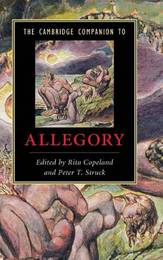
|
The Cambridge Companion to Allegory
Hardback
Main Details
| Title |
The Cambridge Companion to Allegory
|
| Authors and Contributors |
Edited by Rita Copeland
|
|
Edited by Peter T. Struck
|
| Series | Cambridge Companions to Literature |
|---|
| Physical Properties |
| Format:Hardback | | Pages:324 | | Dimensions(mm): Height 235,Width 156 |
|
| Category/Genre | Literature - history and criticism
Literary studies - general |
|---|
| ISBN/Barcode |
9780521862295
|
| Classifications | Dewey:809.915 809.915 |
|---|
| Audience | | Professional & Vocational | | Tertiary Education (US: College) | |
|---|
| Illustrations |
5 Halftones, black and white
|
|
Publishing Details |
| Publisher |
Cambridge University Press
|
| Imprint |
Cambridge University Press
|
| Publication Date |
25 March 2010 |
| Publication Country |
United Kingdom
|
Description
Allegory is a vast subject, and its knotty history is daunting to students and even advanced scholars venturing outside their own historical specializations. This Companion will present, lucidly, systematically, and expertly, the various threads that comprise the allegorical tradition over its entire chronological range. Beginning with Greek antiquity, the volume shows how the earliest systems of allegory developed in poetry dealing with philosophy, mystical religion, and hermeneutics. Once the earliest histories and themes of the allegorical tradition have been presented, the volume turns to literary, intellectual, and cultural manifestations of allegory through the Middle Ages and Renaissance. The essays in the last section address literary and theoretical approaches to allegory in the modern era, from reactions to allegory in the eighteenth and nineteenth centuries to reevaluations of its power in the thought of the twentieth century and beyond.
Author Biography
Rita Copeland is Professor of Classical Studies and English and Chair of Comparative Literature at the University of Pennsylvania. Peter Struck is Associate Professor of Classical Studies and serves on the graduate faculties of Religious Studies and Comparative Literature at the University of Pennsylvania.
Reviews'This collection of essays has two uncommon virtues. First is the nature of the project itself ... unprecedented in its chronological and thematic sweep. Secondly, the editors have managed to make a collection that reads as a whole. One can spend time with the essays in this book, ruminating and reflecting on the powerful role that allegory has played in the history of western literature, art, and thought.' Marc Mastrangelo, Bryn Mawr Classical Review 'This is indeed a strong and well-edited collection, with individual essays that are useful to the teacher, as well as a larger narrative that, by tracing the development of the different, interrelated meanings of allegory, clarifies a complex and ever evolving literary-intellectual tradition.' Journal of English and Germanic Philology
|